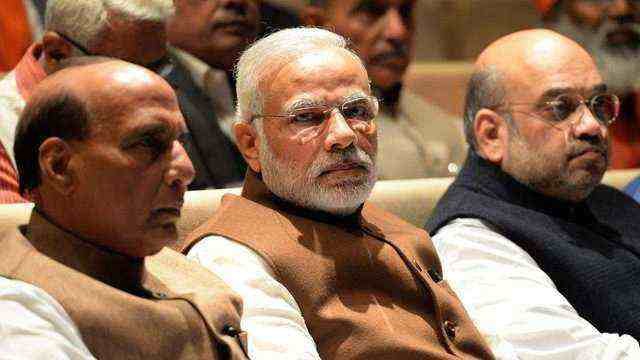
This was Narendra Modi’s last speech in 16th Lok Sabha, his current tenure in office. His address on the floor of the House, a customary concluding remark as the prime minister's motion of thanks to the President's address to both Houses of the Parliament, was thus a very special occasion. The next time Modi rises to speak in the Lower House, he will be in the 17th Lok Sabha.
Modi used the opportunity to the fullest, addressing to a larger audience outside the Parliament in his around 100-minute speech. The nation is already in election mode and Modi is already in the campaign mode. His speech was a good mix of detailing the achievements of his government, a report card of sorts – 55 years of four generations of Congress rule versus 55 months of his rule — clarity on Rafale fighter jets deal, attack and counter-attack on Congress laced with aggressive political rhetoric, humour and sarcasm.
The first voters whom he called the 21st-Century generation and their hopes and aspirations with the society and the government of the day came in for special thrust in his speech. In 2014, the younger lot (18-35 years) had placed a great deal of trust on him. Modi clearly wanted them to continue trusting him and vote accordingly.
Though he used several colloquial Hindi terms, poems and phrases, the term which has the potential to be easily picked up by common people and become instant talking point in corner talks over tea or otherwise in the hinterland is 'Mahamilawati’ (grand political adulteration), a new coinage for the much-hyped 'Mahagathbandhan (grand coalition)' of all opposition or all anti-Modi forces. `Mahamilawati’ has varied connotation in Hindi, and the BJP with the kind of social support base it has will make it a favourable debating point for Modi. He took a dig at the Congress that even it was championing the cause of the Mahamilawati forces.
Hours before Modi rose to speak in Lok Sabha, Rahul Gandhi had called him a “coward person” who did not have the capacity to stand in front of him at any public platform even for five minutes. The Congress president had even gestured at a party function how Modi would run away. When Modi was speaking in the House, Rahul was not present there. Modi didn’t name him but references to him were clear on several occasions right from his "ulta chor chowkidaar ko daante (the thief scolds the policeman)" remark to how the Congress leaders were troubled because his (Modi's) government was coming hard on corruption and those who had looted India and because "rajdars (conspirators)" were brought back to India. With a certain toughness in his tone, Modi said, "Desh ko lootne wale ko Modi dara kar rahega, jinhone desh loota hai unhe darna hi hoga (Modi will terrify all those who have looted the country; those who have looted the country will have to be scared."
Modi's speech incidentally came on a day when Robert Vadra, son-in-law of Sonia Gandhi was forced to appear before the Enforcement Directorate for the second consecutive day (his questioning continued till very late in evening from 11 am in morning) on an alleged money laundering case and questionable acquisition of properties in London and when his wife Priyanka Gandhi Vadra (who had accompanied Robert to the ED office on Wednesday and Thursday) was taking part for the first time in a structured party meet chaired by brother-in-law Rahul.
Modi seemed to be particularly hurt by two accusations — that he was destroying institutions and second, he cared for the rich. He responded to them strongly and effectively.
Responding to Congress and other political rivals, including left-liberals critics, who had accused Modi of destroying institutions, the prime minister mounted a strong counter-attack recalling how the elected Left government in Kerala was thrown out in 1959 when Jawaharlal Nehru was the prime minister and Indira Gandhi was Congress president. Congress misused Article 356 for around 100 times, of which 50 times during Indira Gandhi’s rule, he said, recalling the imposition of Emergencies. Modi also mentioned how in recent months Congress had attacked the Supreme Court, bringing an impeachment motion against former Chief Justice Deepak Misra. Modi also recalled how the Congress had called a former army chief a "goonda" and that it had made false accusations against the army that it was bent on toppling Manmohan Singh government through a military coup. He went to great length on the subject.
On charges that Modi cared only for the rich, the prime minister sarcastically said that he built lakhs of toilets for those rich persons (poor in rural areas), provided houses to those rich, and such persons were everything for him, and how untiring service to them gave him the resolve to work harder as the prime minister.
Modi ended his speech by reminding what he had said when Congress and its prospective allies had brought a no-confidence motion against him in 2018 that he would wish them luck that they somewhat succeed in their venture when they would again move a no-confidence motion in 2023.
The prime minister seemed to be assured of his victory in the upcoming elections in May 2019. During those 100 minutes of Modi’s speech, the mood in treasury benches in the House was upbeat while in the opposition benches, the mood was that of despair. That surely can’t be a barometer of the nation's mood but who goes to the election with what mood matters in the final outcome. Rahul chose to give a miss to that concluding speech by the prime minister.


.jpeg)

